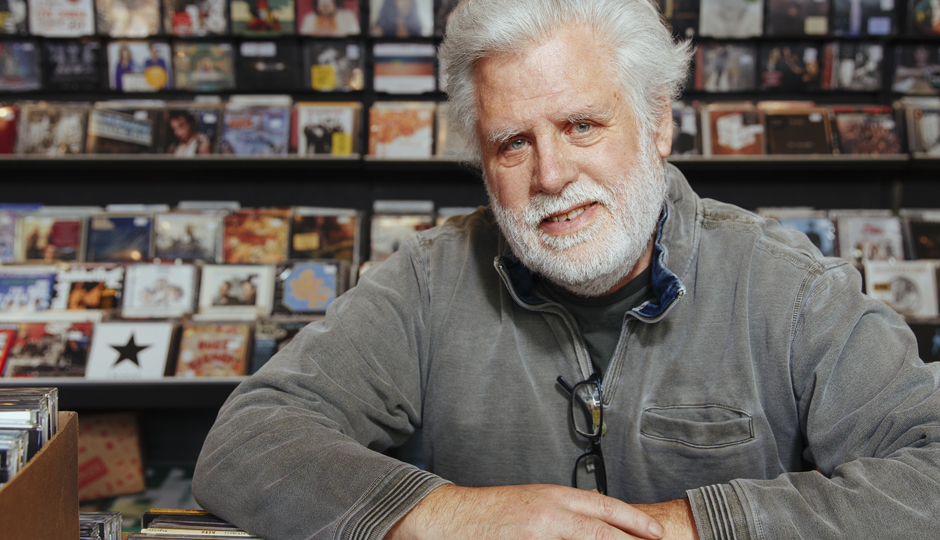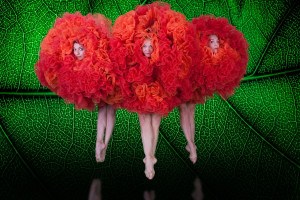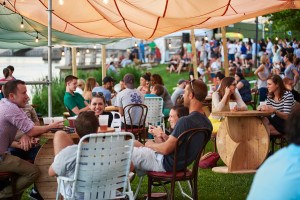On the Record With World Cafe’s David Dye

David Dye gets his hands dirty at Main Street Music | Photograph by Gene Smirnov
The door to Main Street Music swings open, and a windswept-looking David Dye lurches into a room filled with shoppers half his age, thumbing through vinyl like it’s 1970 again.
It’s funny how time works — how you live in a moment that feels like it will last forever, and then suddenly you’re back at the beginning again. Dye has been mulling life’s cyclical mysteries since November, when he announced he would step back as host and producer of World Cafe, WXPN-FM’s nationally syndicated weekday musical cornucopia, after 25 years.
No one in the shop rushes over for an autograph, but once Dye starts talking, a few customers linger next to him for an extra beat. You instantly recognize his voice — sort of a human Hammond organ, brimming with low-fi warmth — the same way you do that of Merrill Reese or Pierre Robert. Dye, 66, chuckles softly as he recalls getting stopped in supermarkets over the years by fans who overheard him chatting with a cashier, or being asked to record people’s voicemail messages.
He scans the racks, and snippets of old conversations come flooding back every time he spots one of the 3,275 performers who’ve appeared on World Cafe since 1991. There’s Beck. And Leonard Cohen. And more recent artists, like Drive-By Truckers and Sturgill Simpson. Then there are the ones he always wanted to have on the show but didn’t, like Bruce Springsteen. “Whenever anybody gets in his presence, he always says, ‘Yeah, David Dye, I should do it,’” Dye sighs. “We’ve been trying.” (Bruce, if you’re reading: There’s still time! But hurry up.)
World Cafe has produced 40 live albums and two books, and hosted shows in Cuba, Brazil and Sweden. Was this all part of the plan, or was the show’s evolution more trial-and-error mixed with flashes of serendipity? “Totally the latter,” Dye says. His career took an uncertain path; a four-year stint at WMMR ended in 1974, and he didn’t know what was next. “I thought radio was a phase. I quit and went traveling. But I ended up back on the radio in Maine, and I realized how much I absolutely loved it.”
He found his way to WXPN, where he started hosting Sleepy Hollow in 1989. Two years later, the station brass asked Dye to contribute to something new, a national show that could attract a younger and more diverse audience. Their first idea, a steady rotation of world music, didn’t test well. Focusing on up-and-coming singer-songwriters proved more of a sweet spot.
Dye is a patient interviewer, adept at getting musicians to relax and share personal anecdotes. But he didn’t develop this ability overnight. “It took me a long time, to be really, really honest,” he says. “My thing was, ‘I want this musician to like me, and therefore he’ll give me better stuff.’ But that wasn’t necessarily the right technique. I needed them to tell me stories, and for the interview to have an arc.”
Lou Reed was brutal. Steve Miller was cranky, but warmed to Dye and sent him old live recordings of blues legend T-Bone Walker. Dye seems mostly at peace with his daily role at WXPN coming to an end on March 31st. “I was starting to feel a little uncomfortable representing my love of all of this new music that I don’t naturally know,” he says. “And that came at the same time that I felt [the job] had become such a treadmill. It was unfair to the show to have somebody feeling that way about it.”
The current plan is for him to continue hosting WXPN’s Funky Friday and contribute some sort of weekly program. “Self-indulgent, carefully planned-out free-form radio” is how he envisions it. He realizes this is another inflection point in his career. When he started World Cafe, he hoped it would find a small but dedicated audience; it now reaches 600,000 listeners weekly. If even a handful of people dig whatever form his next project takes, it will be just as gratifying. “I’m richly, richly lucky to have been able to do this. It was not a bad gig.”
Published as “Digging in the Crates with David Dye” in the January 2017 of Philadelphia magazine.


